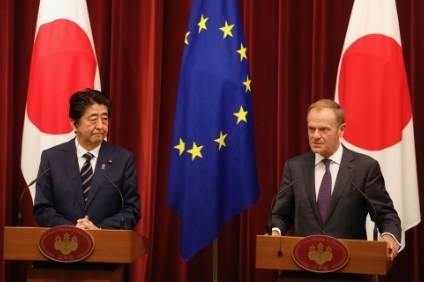
The European Union (EU) signed a free trade agreement (FTA) with Japan on Tuesday (July 17) that will eliminate tariffs on almost all products traded between the two trading blocks.

Japanese Prime
Minister Shinzo Abe (left) and President of the European Council Donald Tusk.
Prime Minister Shinzo Abe signed the trade pact with European
Council President Donald Tusk, who speaks for the 28 EU national leaders, and
European Commission President Jean-Claude Juncker, the bloc's executive head.
Japan and the EU have around 600 million
consumers combined and account for about a third of global GDP. Their trade
relationship has room to grow, according to EU officials who expect the deal to
boost the EU economy by 0.8 percent and Japan's by 0.3 percent over the
long-term.
The agreement is seen as a significant
counter-measure to US President Donald Trump's recent policy of raising tariffs
with its main trading partners.
The deal eliminates about 99% of tariffs
on Japanese goods sold to the EU, while Japan will continue to protect some
segments of its agricultural market - including rice.
The FTA will slash tariffs from 10% to
0% on vehicle imported into Europe from Japan, giving the country's vehicle
industry the same free access to Europe enjoyed by the Republic of Korea (RoK)
vehicle manufacturers since a similar FTA was signed in 2009.
The deal clouds the outlook for Japanese
vehicle manufacturers located in the UK, however, given the potential of
"Brexit" going ahead next year without a customs agreement with the
EU.
The agreement also addresses specific
sensitivities in the EU, for instance in the automotive sector, with transition
periods of up to 7 years before customs duties are fully eliminated.
The agreement is now awaiting
ratification by the European Parliament and the Japanese Diet following which
it could enter into force in 2019.
At the same time, negotiations between the EU
and Japan continue on investment protection standards and investment protection
dispute resolution.
Source: NDO
The first summit between the European Union (EU) and the Gulf Cooperation Council (GCC) in Brussels, Belgium, marked an important step forward in their bilateral relations.
The 45th General Assembly of the ASEAN Inter-Parliamentary Assembly (AIPA-45) opened in Vientiane on October 19.
Many countries are grappling with rapidly aging population. As population aging becomes an irreversible global trend with significant impacts on economic and social sectors, nations face the urgent task of creating flexible policies to adapt to and make the most of this trend to build prosperous and sustainable societies.
With a series of stimulus measures, the world tourism industry is on the way to recovery as before the COVID-19 pandemic broke out. Facing the opportunity to take off, the "smokeless industry” is expected to strongly contribute to global economic growth while promoting potential and cohesion, contributing to peace and sustainable development.
The danger from the COVID-19 pandemic is still latent, threatening people’s health and lives in the context that the immunity provided from the COVID-19 vaccine has decreased. Many other dangerous diseases are also likely to break out when the global vaccination rate slows down, due to inequality in access to health services, vaccine hesitancy, and consequences of economic recession.
The Association of Southeast Asian Nations (ASEAN) is witnessing a rise in the sales of electric vehicles (EVs) in Vietnam, Malaysia and Indonesia, according to Maybank Investment Bank Research (Maybank IB Research).



